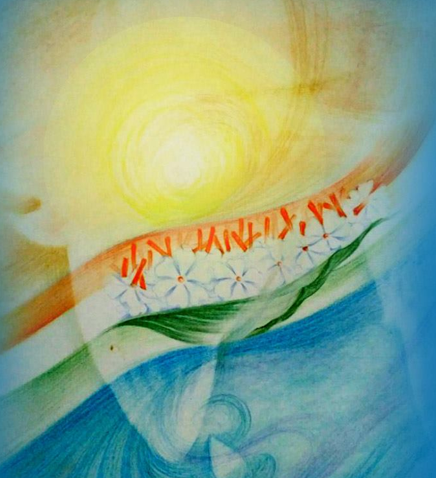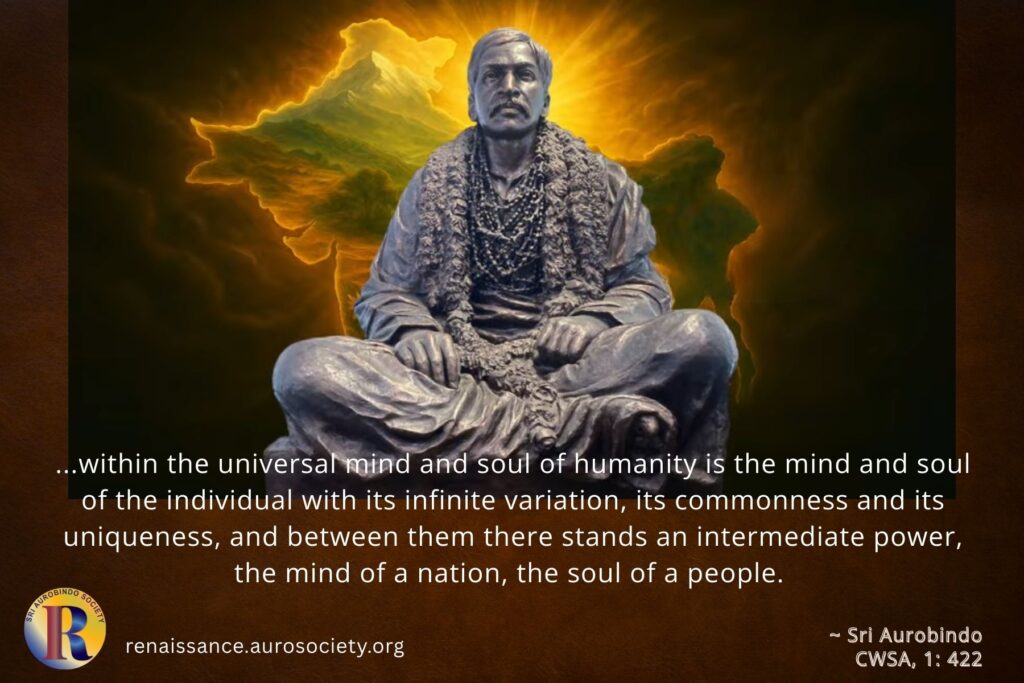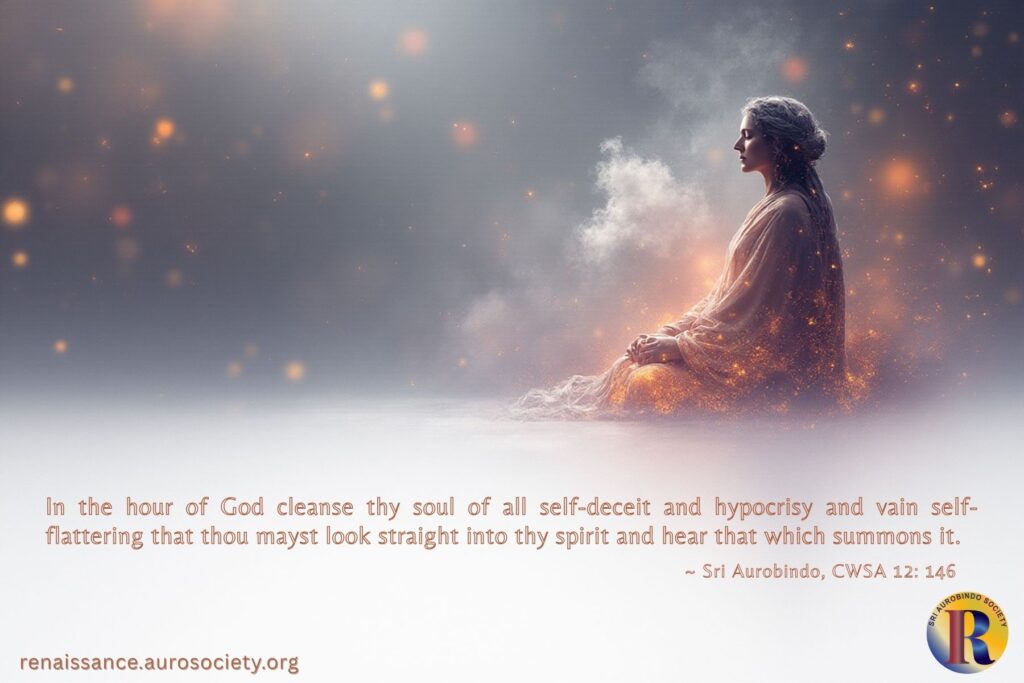Volume 1, Issue 6
Author: Agali Venkappa Sastri
Continued from Part 9
BEYOND MORAL NATIONALISM
There is a constant permeation of the planes, and even though we have no access to the highest, the spiritual and the supramental, we share by our aspiration whatever admixture, infiltration of the highest is achieved at our present level, and by virtue thereof, attain partial results.
The spirit is the sole power. We give credit to our intellectual policies, our present modes of working, while all the while they are really derived from the highest planes, attenuated reflections of the Real. But for anything like transformation, for a radical remoulding of our nature, we have to lay ourselves open to the descent of the Divine, abolish the ego and convert ourselves into instruments for the work of the Divine.
We Indians have passed through a moral phase of nationalism. It cannot be the final. “The effort at governing political action by ethics is usually little more than a pretence.” (CWSA, Vol. 20, p. 397) Exceptional individuals may regulate their political conduct by strict moral injunctions; even they, proceeding by mental and moral rule, cannot escape miscalculation.
Writes Sri Aurobindo:
Sattwa binds by knowledge and pleasure; it is always attaching itself to some imperfect realisation, to the idea of one’s own virtue, the correctness of one’s own opinions and principles or at its highest, as in the case of Arjuna, opposing some personal idea of altruism, justice or virtue against the surrender of our will that God demands of us.
It is for the escape from the sattwic ahaṅkāra that we have to pass beyond the attachment to the duality of virtue and sin, ubhe sukṛtaduṣkṛte.
~ CWSA, Vol. 13, p. 84
Also this:
There is no passion so terrible as the passion of the altruist, no egoism so hard to shake as the fixed egoism of virtue, precisely because it is justified in its own eyes, and justified in the sight of men and cannot see the necessity of yielding to a higher law.
~ ibid, p. 79
Action will be infallible only when it draws down a higher sanction, a supra-ethical descent of divine energy, when man becomes an absolutely pure channel of His will and puissance. Meanwhile what saves us is our moral purity, loftiness of motive, integrity of conduct, – qualities not at all to be underrated but to be diligently sought after as a first condition without which there is no transcending the ‘modes of nature.’

ETHICS – A STAGE IN EVOLUTION
The meaning of ethics considered from a metaphysical standpoint, its transitional value is characterised by Sri Aurobindo in the following paras which I extract for the highest perspective of the entire ethical problem:
We have to recognise, if we thus view the whole, not limiting ourselves to the human difficulty and the human standpoint, that we do not live in an ethical world.
The attempt of human thought to force an ethical meaning into the whole of Nature is one of those acts of wilful and obstinate self-confusion, one of those pathetic attempts of the human being to read himself, his limited habitual human self into all things and judge them from the standpoint he has personally evolved, which most effectively prevent him from arriving at real knowledge and complete sight.
Material Nature is not ethical; the law which governs it is a co-ordination of fixed habits which take no cognizance of good and evil, but only of force that creates, force that arranges and preserves, force that disturbs and destroys impartially, non-ethically, according to the secret Will in it, according to the mute satisfaction of that Will in its own self-formations and self-dissolutions.
Animal or vital Nature is also non-ethical, although as it progresses it manifests the crude material out of which the higher animal evolves the ethical impulse. We do not blame the tiger because it slays and devours its prey any more than we blame the storm because it destroys or the fire because it tortures and kills; neither does the conscious-force in the storm, the fire or the tiger blame or condemn itself.
Blame and condemnation, or rather self-blame and self-condemnation, are the beginning of true ethics. When we blame others without applying the same law to ourselves, we are not speaking with a true ethical judgment, but only the language ethics has evolved for us to an emotional impulse of recoil from or dislike of that which displeases or hurts us.
This recoil or dislike is the primary origin of ethics but is not itself ethical. The fear of the deer for the tiger, the rage of the strong creature against its assailant is a vital recoil of the individual delight of existence from that which threatens it. In the progress of the mentality it refines itself into repugnance, dislike, disapproval.
Disapproval of that which threatens and hurts us, approval of that which flatters and satisfies refine into the conception of good and evil to oneself, to the community, to others than ourselves to other communities than ours, and finally into the general approval of good, and general disapproval of evil. But, throughout, the fundamental nature of the thing remains the same.
Man desires self-expression, self-development, in other words, the progressing play in himself of the conscious-force of existence; that is his fundamental delight. Whatever hurts that self-expression, self-development, satisfaction of his progressing self, is for him evil; whatever helps, confirms, raises, aggrandises, ennobles it is his good.
Only, his conception of the self-development changes, becomes higher and wider, begins to exceed his limited personality, to embrace others, to embrace all in its scope.
In other words, ethics is a stage in evolution. That which is common to all stages is the urge of Sachchidananda towards self-expression. This urge is at first non-ethical, then infra-ethical in the animal, then in the intelligent animal even anti-ethical for it permits us to approve hurt done to others which we disapprove when done to ourselves.
In this aspect man even now is only half-ethical. And just as all below us is infra-ethical, so there may be that above us whither we shall eventually arrive, which is supra-ethical, which has no need of ethics.
The ethical impulse and attitude, so all-important to humanity, is a means by which it struggles out of the lower harmony and universality based upon inconscience and broken up by life into individual discords towards a higher harmony and universality based upon conscient oneness with all existences.
Arriving at that goal, this means will no longer be necessary or even possible, since the qualities and oppositions on which it depends will naturally dissolve and disappear in the final reconciliation. ()
~ CWSA, Vol. 21, pp. 103-104
Continued in Part 11
Cover image – Bhārata Mahima, by Ritam Upadhyay



